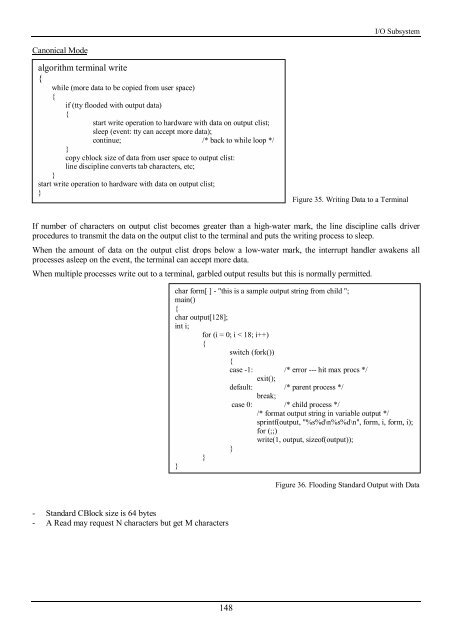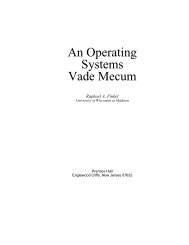You also want an ePaper? Increase the reach of your titles
YUMPU automatically turns print PDFs into web optimized ePapers that Google loves.
I/O Subsystem<br />
Canonical Mode<br />
algorithm terminal write<br />
{<br />
while (more data to be copied from user space)<br />
{<br />
if (tty flooded <strong>with</strong> output data)<br />
{<br />
start write operation to hardware <strong>with</strong> data on output clist;<br />
sleep (event: tty can accept more data);<br />
continue; /* back to while loop */<br />
}<br />
copy cblock size of data from user space to output clist:<br />
line discipline converts tab characters, etc;<br />
}<br />
start write operation to hardware <strong>with</strong> data on output clist;<br />
}<br />
Figure 35. Writing Data to a Terminal<br />
If number of characters on output clist becomes greater than a high-water mark, <strong>the</strong> line discipline calls driver<br />
procedures to transmit <strong>the</strong> data on <strong>the</strong> output clist to <strong>the</strong> terminal and puts <strong>the</strong> writing process to sleep.<br />
When <strong>the</strong> amount of data on <strong>the</strong> output clist drops below a low-water mark, <strong>the</strong> interrupt handler awakens all<br />
processes asleep on <strong>the</strong> event, <strong>the</strong> terminal can accept more data.<br />
When multiple processes write out to a terminal, garbled output results but this is normally permitted.<br />
char form[ ] - "this is a sample output string from child ";<br />
main()<br />
{<br />
char output[128];<br />
int i;<br />
for (i = 0; i < 18; i++)<br />
{<br />
switch (fork())<br />
{<br />
case -1: /* error --- hit max procs */<br />
exit();<br />
default: /* parent process */<br />
break;<br />
case 0: /* child process */<br />
/* format output string in variable output */<br />
sprintf(output, "%s%d\n%s%d\n", form, i, form, i);<br />
for (;;)<br />
write(1, output, sizeof(output));<br />
}<br />
}<br />
}<br />
Figure 36. Flooding Standard Output <strong>with</strong> Data<br />
- Standard CBlock size is 64 bytes<br />
- A Read may request N characters but get M characters<br />
148
















